How much do cows weigh in pounds & kilograms
Published: April 19, 2023
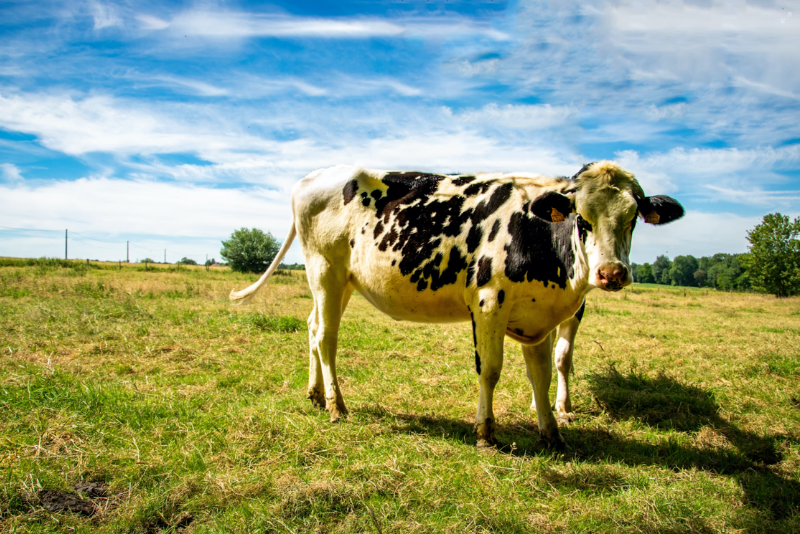
There's no question that cows are generally large animals. But how much does a cow weigh, and what factors influence how much it does?
This article will examine the different types of cows and their weights. We will compare beef, calf, and dairy cows and their weights and learn about the biggest influences on a cow's weight. We'll even discuss how much meat a cow gives.
How much does a cow weigh on average?
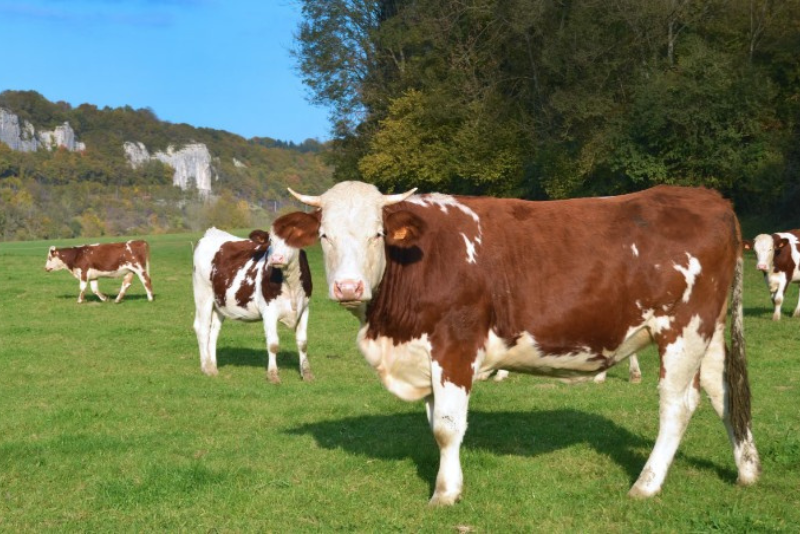
The average cow weighs about 1,200 to 1,500 pounds. However, numerous factors will affect the average weight of a cow, such as its breed, gender, and what it eats, which is discussed in more detail later in this article.
The heaviest cow breed is the Chianina, which can weigh up to 3,500 pounds. Chianina cows are naturally larger and taller than other breeds, which allows them to consume more food and grow to impressive sizes. The Chianina cow also has an excellent metabolism, allowing it to convert food into muscle faster than most other cows.
The smallest cow breed is the Vechur which weighs around 300 lbs on average. The Vechur yields up to three liters of milk daily, much less than other breeds. However, this makes the Vechur perfect for farmers or hobbyists looking for a cow breed that requires little feed and maintenance.
And let's not forget about the miniature versions of cow breeds, like the incredibly adorable and popular Mini Highland cow. Mini Highland cows weigh between 500 and 1000 pounds on average and make excellent pets.
How much does a calf weigh on average?

A calf is a young bovine, typically younger than two years old. Once a calf turns two, they're usually considered a cow.
Calves are usually born after a nine-month gestation period, and they can be dairy or beef calves depending on the breed of cow they were born from. Calves will typically nurse from their mothers until they are mature enough to feed and care for themselves.
Most calves weigh between 65 and 90 pounds at birth, largely dependent on their breed. Bull calves tend to be heavier than heifers because they are carried longer.
Here is how much a calf weighs on average from some of the most popular cow breeds ranging from one to twelve months.
Breed | Month 1 | Month 2 | Month 3 | Month 4 | Month 5 | Month 6 | Month 7 | Month 8 | Month 9 | Month 10 | Month 11 | Month 12 |
Holstein | 82-143 lbs, 37.2-65 kg | 113-238 lbs, 51-108 kg | 149-284 lbs, 68-129 kg | 189-339 lbs, 86-154 kg | 218-411 lbs, 99-186 kg | 266-480 lbs, 121-218 kg | 301-542 lbs, 137-246 kg | 330-603 lbs, 150-274 kg | 379-705 lbs, 172-320 kg | 422-776 lbs, 191-352 kg | 445-776 lbs, 202-352 kg | 504-843 lbs, 229-382 kg |
Jersey | 93-108 lbs, 42-49 kg | 122-146 lbs, 55-66 kg | 155-177 lbs, 70-80 kg | 183-217 lbs, 83-98 kg | 233-278 lbs, 106-126 kg | 259-321 lbs, 118-146 kg | 303-362 lbs, 137-164 kg | 335-412 lbs, 152-187 kg | 373-436 lbs, 169-198 kg | 391-483 lbs, 177-219 kg | 428-499 lbs, 194-226 kg | 471-548 lbs, 214-249 kg |
Ayrshire | 131-154 lbs, 59-70 kg | 177-205 lbs, 80-93 kg | 223-256 lbs, 101-116 kg | 269-307 lbs, 122-139 kg | 315-357 lbs, 143-162 kg | 360-407 lbs, 163-185 kg | 405-457 lbs, 184-207 kg | 450-506 lbs, 204-230 kg | 494-554 lbs, 224-251 kg | 538-602 lbs, 244-273 kg | 581-650 lbs, 264-295 kg | 624-697 lbs, 283-316 kg |
How much does a dairy cow weigh on average?
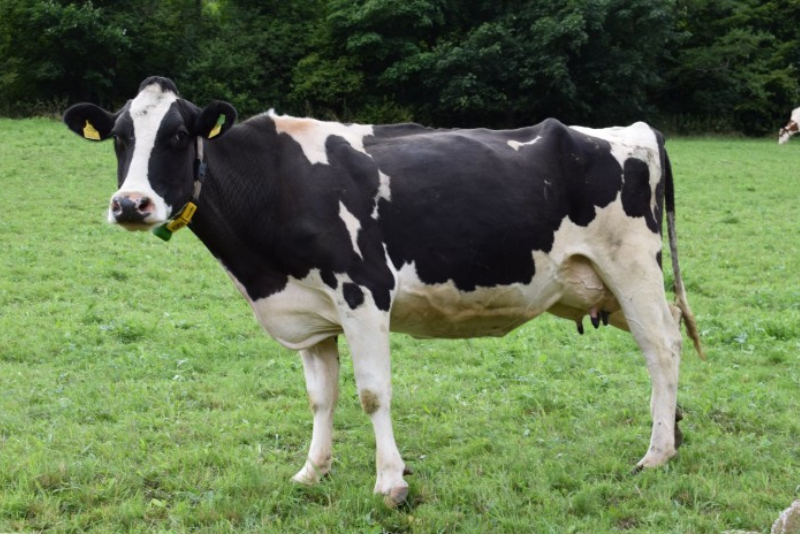
A dairy cow is a bovine breed specifically to produce milk. Dairy cows are usually of the Holstein, Jersey, Guernsey, or Brown Swiss breeds, and they require extra care and attention over other cattle breeds to get the most out of their milk production.
Dairy cows typically weigh 800 to 1,500 lbs or more when fully grown, while beef cows weigh 2,500 lbs or more. While the heavier weight of a beef cow generally makes it more valuable for meat production, dairy cows can produce more milk in their lifetime and are thus more valued for their production of dairy products.
Here is how much male and female dairy cows weigh on average from some of the most popular dairy cow breeds.
Breed | Male Weight | Female Weight |
1200-1400 lbs, 545-635 kg | 1500-1700 lbs, 680-770 kg | |
1300-1500 lbs, 600-700 kg | 800-900 lbs, 350-400 kg | |
Up to 2000 lbs, 907 kg | 1300-1400 lbs, 590-635 kg | |
1300-1500 lbs, 600-700 kg | 1000-1100 lbs, 450-500 kg | |
1400-1984 lbs, 635-900 kg | 990-1320 lbs, 450-600 kg | |
2200-2400 lbs, 998-1089 kg | 1400-1600 lbs, 635-726 kg |
How much does a beef cow weigh on average?
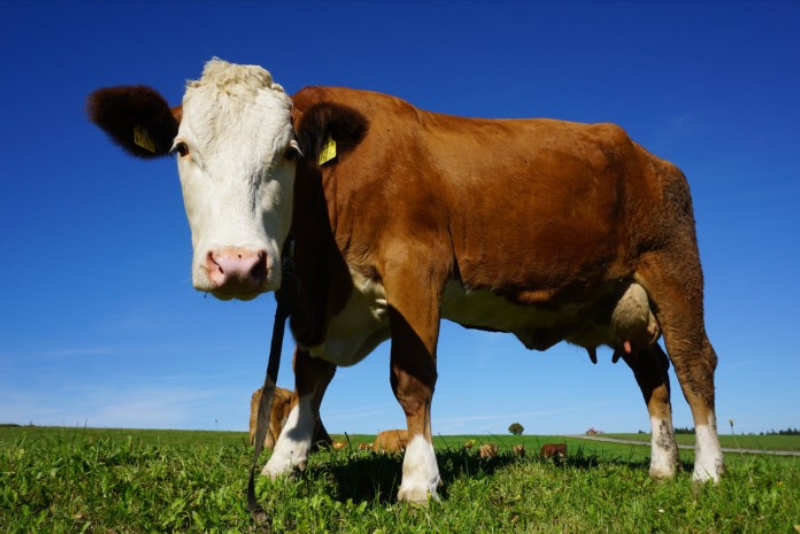
A beef cow is a type of cattle bred specifically for meat production. Beef cows are heavier than dairy cows because they have been selectively bred for many generations to produce more muscle, which makes them larger and heavier. They also tend to be of the Angus or Hereford breed, larger cattle breeds.
This combination of selective breeding and genetic makeup makes beef cows significantly heavier than dairy cows.
Here is how much male and female beef cows weigh on average from some of the most popular beef cow breeds (with the Angus beef cow being the most popular in the United States.)
Breed | Male Weight | Female Weight |
1850-2300 lbs, 840-1045 kg | 1150-1250 lbs, 520-565 kg | |
2204-3638 lbs, 1000-1650 kg | 1543-2646 lbs, 700-1200 kg | |
1800-1874 lbs, 816-850 kg | 1191-1323 lbs, 540-600 kg | |
2315-2865 lbs, 1050-1300 kg | 1545-1985 lbs, 700-900 kg | |
1200-1500 lbs, 544-680 kg | 900-1200 lbs, 408-544 kg | |
1500-2000 lbs, 680-910 kg | 900-1200 lbs, 410-545 kg |
What factors influence how much a cow weighs?
Many factors can influence the weight of a cow. The most prominent include age, gender, breed, feed type, feed quantity, activity level, and cow type (beef or dairy).
Age

The age of a cow plays a vital role in its weight.
Generally, younger cows weigh less than older ones since they are still growing and developing. Calves usually weigh between 65-90 lbs (30-40 kg). However, as the cow reaches maturity, its growth rate begins to slow down, leading to a gradual increase in its weight over time.
Older cows typically require more feed than their younger counterparts as they need more energy to keep up with their activities.
By providing adequate food and ensuring the cow's diet is balanced and nutritious, age should not be a limiting factor in achieving healthy weights for cattle.
Gender
Gender is a significant factor in determining the weight of cows.
Male cows (bulls) and females have differences in muscle and body fat composition, leading to gender-specific weight differences. As a result, male cattle tend to be heavier than female cows.
Since bulls are more muscular, it's natural for them to become designated protectors from predators. It's also in a bull's nature to size other bulls up to become the top dog (or bull, in this case), especially during the breeding season. This results in males generally being heavier than females, meaning bulls weigh more than female cows on average.
Breed

A cow's breed is one of the main factors influencing its weight.
Different cattle breeds exist for different purposes, which has led to significant differences in their growth and size.
Generally, dairy breeds are smaller than beef breeds due to selective breeding aimed at maximizing milk production rather than meat production. Some of the most popular dairy cow breeds include the following:
Holstein
Jersey
Brown Swiss
Guernsey
Ayrshire
Shorthorn
The heaviest dairy cow breed is a Holstein, which typically weighs between 1,500 and 1,700 pounds (680-771 kg). On the other end of the spectrum, the smallest dairy cow breed is a Jersey, which typically averages 770-880 pounds (349-400 kg).
The larger beef breeds tend to be heavier and develop more muscle than their dairy counterparts, leading to a heavier overall weight. Some of the most popular beef cow breeds include the following:
Angus
Hereford
Gelbvieh
Limousin
Simmental
Charolais
The heaviest beef cow breed is the Chianina, which can weigh up to 3,500 pounds (1588 kg). On the other hand, the smallest beef cow breed is the Lowline Angus, which weighs between 650-1100 pounds (295-500 kg).
Some crossbred cows will exhibit traits from both parent breeds, meaning they can weigh more than single-breed cattle.
Diet

A cow's diet significantly impacts its weight, as different types of feed and the amount given can drastically affect its growth.
Cows that are fed higher-quality feeds such as corn grains will produce more fat and weigh more than cows that eat grass.
In addition, the amount of food given to the cow also has an effect, as too little or too much can cause them to become underweight or overweight, respectively.
For example, if the cow's location is rainier, more grass will grow for it to graze on, which could increase its weight as opposed to a location experiencing drought.
Maintaining a healthy and balanced diet for cows is key in ensuring they reach optimal weight.
Activity level
A cow's activity level has a direct influence on its weight. More active cows require more energy and, therefore, need to consume more feed to maintain their body mass.
However, cows that stay in one place tend to gain weight since they do not use the energy from the feed. So if a cow is lazy, it will naturally gain more weight.
A cow's activity level goes hand in hand with its environment. For example, the cow will likely be more active if the cow has more land to graze and roam around. If the land has more hills and inclines, this will cause the cow to burn more calories and be leaner. If the weather is too cold or hot for the cow, the cow will likely not want to be as active.
A cow's weight also depends on how often and for how long the farmer allows their cattle to be outside. The longer and more frequently a cow is outside, the leaner it will be.
All these factors contribute to the overall weight of a cow, making activity level an important consideration when managing cattle.
Purpose
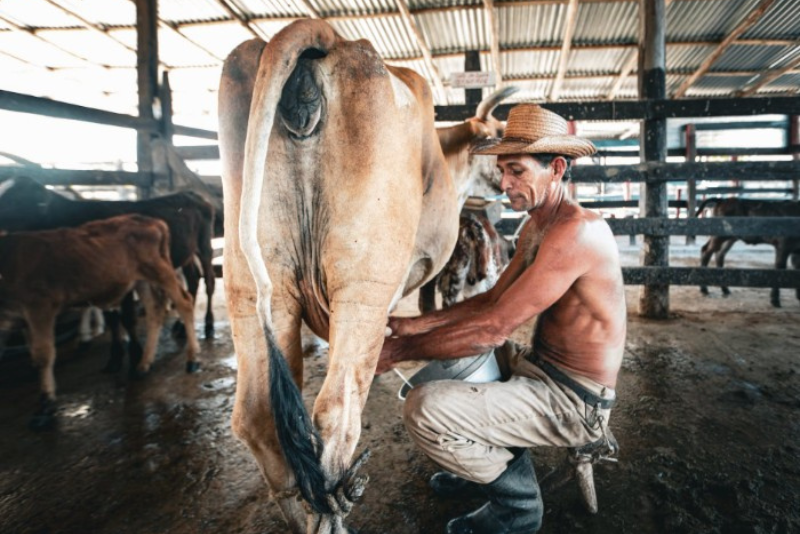
The purpose of a cow, being either a dairy or beef cow, will determine its weight because cows have been selectively bred to reach desired traits for their respective purposes.
Beef cows are generally heavier than dairy cows because they have been bred for growth and muscle development. This maximizes the amount of meat that can be obtained from each animal, which is why beef cattle are typically larger and heavier than dairy cattle.
Beef cows also tend to have higher body fat levels than dairy cows, which further contributes to the increased weight of beef cattle.
How much meat does a cow give?

Depending on the size of the cow, a whole 1200-pound cow will get you a carcass weight of around 750 pounds (340 kg) of edible meat. That's 62.5% of the entire cow's weight. This is because the total amount of meat depends on how it is butchered and processed. Some parts may be unsuitable for consumption or have been cut away during the process.
The beef cuts usually harvested from a cow include chuck, rib, loin, round, brisket, shank, flank, and plate.
In this example, we will look at the beef carcass yields from a 1200-pound cow and the different cuts you will get from it.
Chuck: 29% of the total carcass, which is 217.5 lbs (100 kg)
Round: 22% of the total carcass, which is 165 lbs (75 kg)
Loin (including sirloin): 16% of the total carcass, which is 120 lbs (55 kg)
Rib: 9% of the total carcass, which is 68 lbs (31 kg)
Plate: 9% of the total carcass, which is 68 lbs (31 kg)
Flank: 5% of the total carcass, which is 38 lbs (17 kg)
Brisket: 4% of the total carcass, which is 30 lbs (14 kg)
Shank: 3% of the total carcass, which is 22.5 lbs (10 kg)
FAQ
How much does a full-grown cow weigh?
A full-grown cow typically weighs 1,200 and 1,500 pounds or more (on average, around 1,400 lbs). However, this can vary greatly depending on the breed and the animal's nutrition, among other factors. The largest cow, the Chianina, can weigh up to 3,500 pounds.
How heavy is a cow in KG?
A full-grown cow typically weighs between 544 and 680 kilograms. This can vary depending on the breed and the animal's nutrition, with some cows reaching up to 907 or more kilograms in weight.
How much meat do you get out of a 1200-pound cow?
You can typically get around 450 pounds of beef from a 1200-pound cow. This amount can vary depending on the animal's bone structure and fat content.
How much meat do you get from a 500 lb cow?
You can get around 312.5 pounds of beef from a 500-pound cow. However, as with a 1200-pound cow, this amount can vary depending on the cow's fat content and bone structure.
How much does a cow weigh at slaughter?
The average weight of a cow at slaughter is around 1400 pounds. This includes the hide and internal organs, so the meat obtained from a cow at slaughter will be much less than when it was alive.
A 1400-pound cow will yield a hot carcass weight of 880 pounds. Once it's cooled, it will be around 840 pounds.
Conclusion
The weight of cows can vary depending on the type of cow and many factors, including age, gender, breed, diet, activity level, and purpose.
Beef cows can weigh up to 3500 lbs (1500 kilograms), while dairy cows can weigh up to 2200 lbs (1000 kilograms).
Calf cows are much smaller than beef and dairy cows and weigh only between 65 and 90 lbs (30-40 kg).
While this article focused on the weight of cows, it’s also important to note that their height also affects their total weight. It's also essential that farmers regularly weigh their cows so they are aware of each animal’s health.
Understanding how much a cow weighs is an essential factor for farmers.
We hope you found this article helpful and answered all your questions about how much a cow weighs.
Keep track of all your cattle with the #1 Cattle Management Software
Try out Ranchr today for free